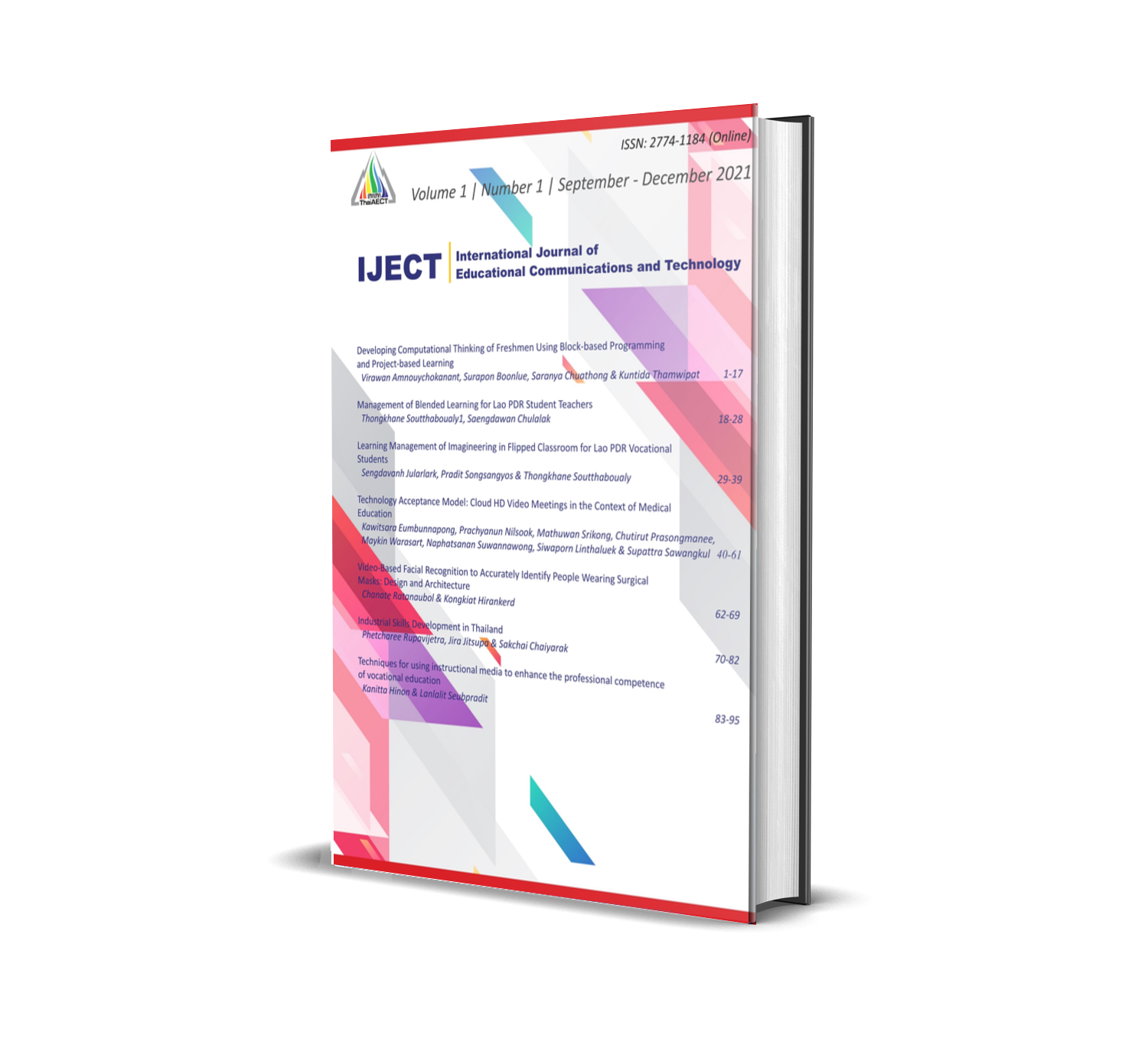Digital Learning on Smart Space to Promote High Performance Digital University
Keywords:
digital learning, smart space, digital universityAbstract
The organization or university has a framework method that defines its organizational structure. Standards of information and administration, as well as administrator policies, goals, missions, strategies, and strategies to develop and drive the organization to be efficient and effective, are all important for a digital university. The university develops information systems to support use, management, and other essential tasks, such as teaching, research, and administration. It also systematically collects data and communicates and exchanges knowledge to bring ideas to improve the organization. This results in an efficient work process, making the organization a high-performance digital university. The objective of this research is to explore literature and synthesize elements of Smart Space to promote high performance digital universities. The results of the research showed that the components of Smart Space consist of 6 components as follows: 1) Communication, 2) Information sharing, 3) Real-time, 4) Wireless, 5) Network, and 6) Interactive. Transforming traditional classrooms into smart learning spaces encourages learners to access resources and engage in collaborative activities. It also promotes effective communication and the sharing of data with cloud-based platforms. This research explored the characteristics of intelligent learning spaces in order to improve the effectiveness of teaching and learning management. Collaborative communication between learners is important, and instructors play a vital role in the learning environment, both during and after school hours. Current platform technology, such as teleconferencing, facilitates this communication. Encouraging collaboration through intelligent learning spaces can foster critical thinking and problem-solving skills for learners.
References
André de Waal. (2019). The Role of Performance Management in Creating and Maintaining a High-Performance Organization. Journal of Advances in Management Research, 16(3), 352–377.
Bagorogoza, J. K., Herik, J. van den, Waal, A. de, & Walle, B. van de. (2023). The mediating effect of knowledge management in the relationship between the HPO framework and performance. International Journal of Productivity and Performance Management, ahead-of-print(ahead-of-print). https://doi.org/10.1108/IJPPM-03-2022-0155
Bećirović, S., & Dervić, M. (2023). Students’ perspectives of digital transformation of higher education in Bosnia and Herzegovina. THE ELECTRONIC JOURNAL OF INFORMATION SYSTEMS IN DEVELOPING COUNTRIES, 89(2), e12243. https://doi.org/10.1002/isd2.12243
Bhardwaj, S., Ozcelebi, T., Lukkien, J. J., & Lee, K. M. (2018). Smart space concepts: A survey. ACM Computing Surveys (CSUR), 51(1).
Bygstad, B., Øvrelid, E., Ludvigsen, S., & Dæhlen, M. (2022). From dual digitalization to digital learning space: Exploring the digital transformation of higher education. Computers & Education, 182, 104463. https://doi.org/10.1016/j.compedu.2022.104463
de Waal, A. (2007). The characteristics of high-performance organization. Business Strategy Series, 8(3), 179–185.
Jo, H., Aryee, S., Hsiung, H.-H., & Guest, D. (2023). Service-oriented high-performance work systems and service role performance: Applying an integrated extended self and psychological ownership framework. Human Relations, 76(1), 168–196. https://doi.org/10.1177/00187267211035656
Johnson, D. W., & Johnson, R. T. (2017). The role of smart spaces in promoting sustainability. Sustainability. Sustainability, 9(2), 237.
Lin, M.-H., Chen, H.-C., & Liu, K.-S. (2017). A Study of the Effects of Digital Learning on Learning Motivation and Learning Outcome. Eurasia Journal of Mathematics, Science and Technology Education, 13(7), 3553–3564. https://doi.org/10.12973/eurasia.2017.00744a
Marin Lujak. (2019). Application of Agreement Technologies (AT) in Smart Spaces: State of the Art in the development of control and monitoring services.
Peters, O. (2000). Digital Learning Environments: New Possibilities and Opportunities. International Review of Research in Open and Distributed Learning, 1(1), 1–19. https://doi.org/10.19173/irrodl.v1i1.3
Puncreobutr, V., Waiyakarn, S., & Tapaneeyakorn, W. (2022). Factors Influencing The Development Of Digital Literacy Skills In Thailand According To The Thailand 4.0 Policy. 19(2).
Purwanto, A., Purba, J. T., Bernarto, I., & Sijabat, R. (2023). Investigating the role digital transformation and human resource management on the performance of the universities (SSRN Scholarly Paper 4490083). https://papers.ssrn.com/abstract=4490083
Thanachawengsakul, N., Wannapiroon, P., & Nilsook, P. (2019). The Knowledge Repository Management System Architecture of Digital Knowledge Engineering using Machine Learning to Promote Software Engineering Competencies. International Journal of Emerging Technologies in Learning (iJET), 14, 42. https://doi.org/10.3991/ijet.v14i12.10444
Umnapiang, P. (2022). The Development of Intelligence Learning Media for Improving Occupational Competence in Thailand Information and Digital Content Competency Level 3. Journal of Technical Education and Training, 14(2), Article 2.
Zhang, H., Lu, R., & Liu, P. (2023). Constructing a Model of Intelligent Learning Space for Vocational Education in the Age of Intelligence. Proceedings of the 2023 4th International Conference on Artificial Intelligence and Education (ICAIE 2023). (137–152). https://doi.org/10.2991/978-94-6463-242-2_18
Downloads
Published
How to Cite
Issue
Section
License
Copyright (c) 2023 International Journal of Educational Communications and Technology

This work is licensed under a Creative Commons Attribution-NonCommercial-NoDerivatives 4.0 International License.







